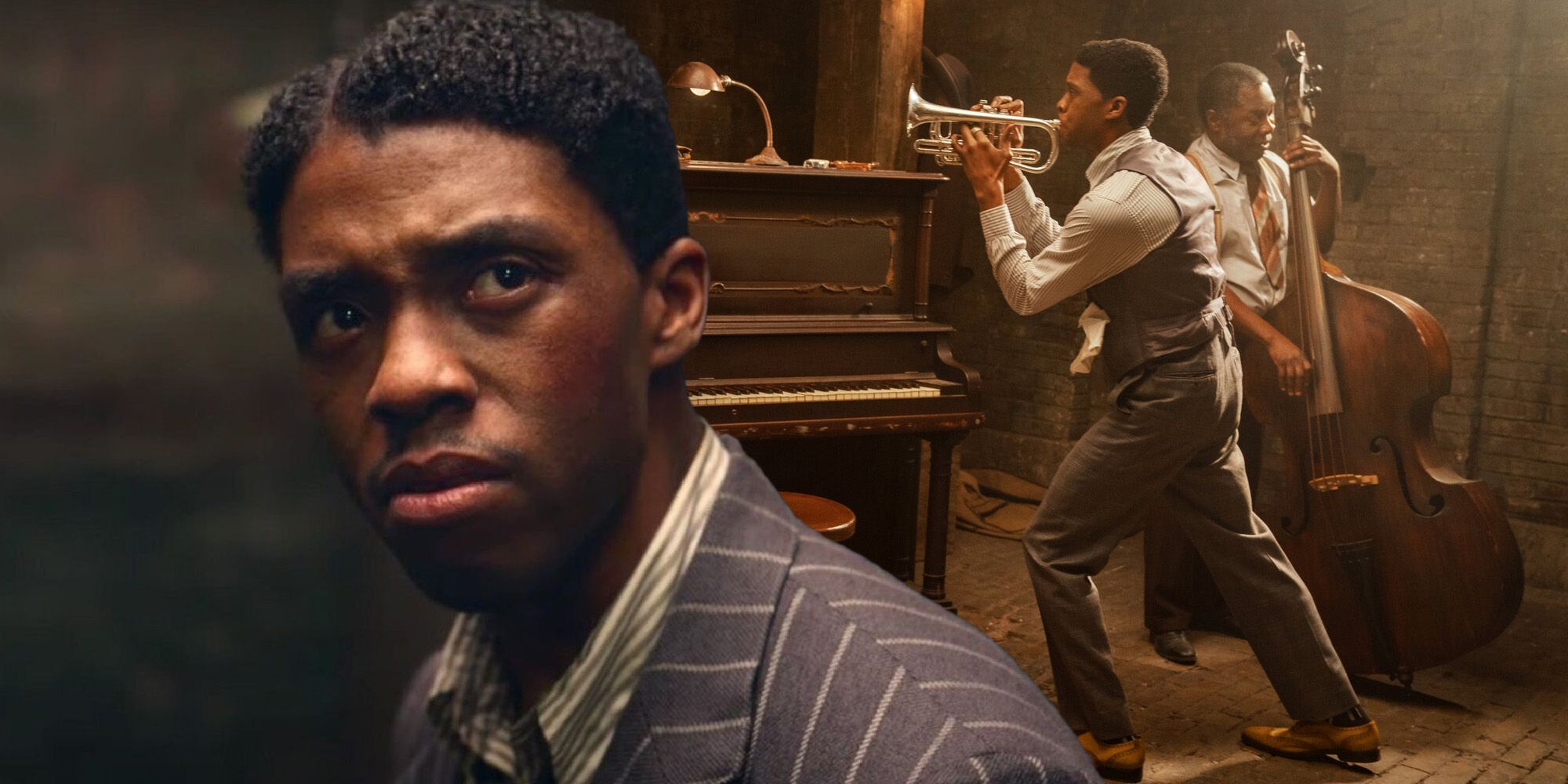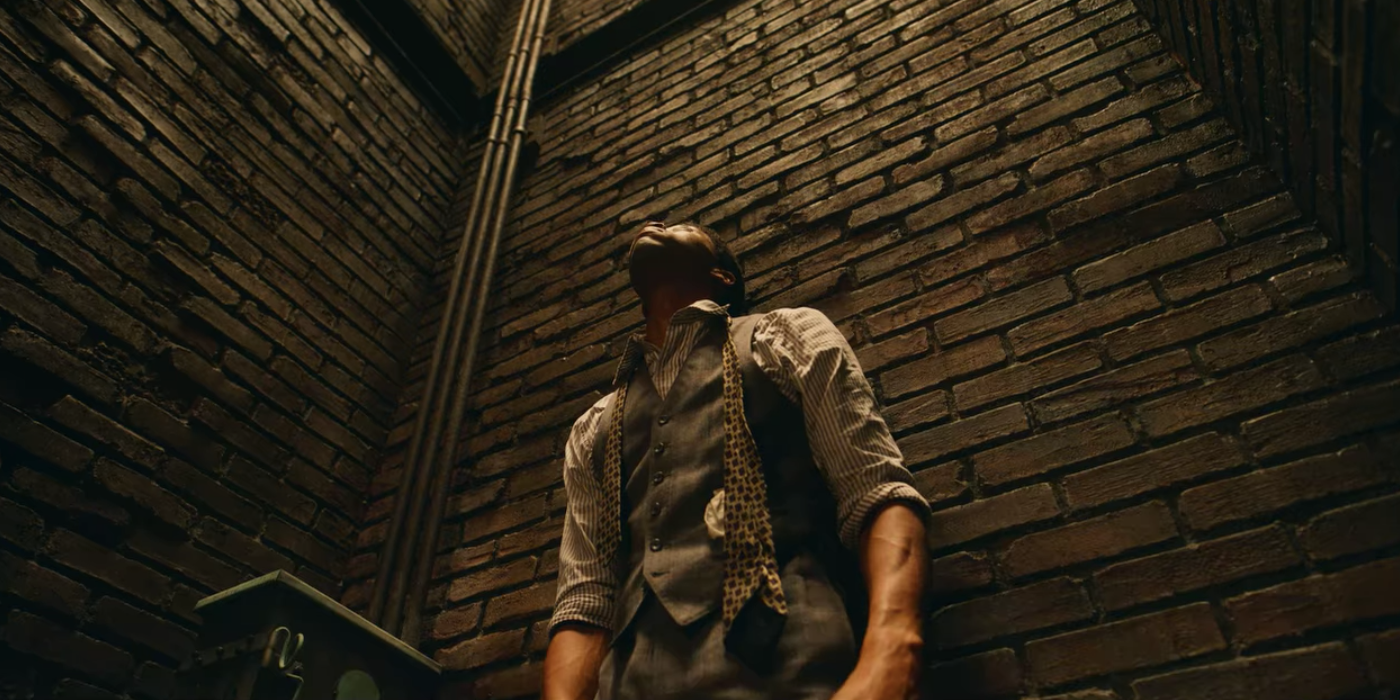WARNING: Spoilers for Ma Rainey's Black Bottom.
What's the significance of the "closed door" in Ma Rainey's Black Bottom? In the 2020 Netflix film, the late Chadwick Boseman stars as the charismatic trumpeter Levee, a man whose sense of pride often gets in the way of his goals. Levee talks the talk and even walks the walk as a performer, yet his brash personality rubs his colleagues the wrong way. Incidentally, the closed door sequences function as metaphoric subtext for his inevitable, and tragic, character arc.
Set in 1920s Chicago, Ma Rainey's Black Bottom stars Viola Davis as the title character; a real-life blues singer and musical pioneer. As Ma makes her way to a recording session, Levee and his bandmates discuss their career ambitions. Boseman's character is immediately established as the loudmouth of the group, someone who wants to draw attention with his yellow shoes and slick threads. However, Toledo (Glynn Turman), Cutler (Colman Domingo), and Slow Drag (Michael Potts) aren't impressed by Levee's boasting and posturing. Importantly, the trumpeter does indeed have plenty of vulnerable moments in Ma Rainey's Black Bottom, specifically when he recalls the lynching of his father by white men, but he always ends up suggesting that the world owes him better days. "Can't tell a fool nothin,'" Slow Drag says, "you'll see."
In Ma Rainey's Black Bottom, the "closed door" motif is introduced early on. Levee shows up late for work with a brand new pair of shoes, and then admires himself in a mirror. Boseman's character subsequently tries to open up a rehearsal room door but can't manage to get it open. "Damn! They done changed things around," Levee says, which prompts a snarky commentary from Toledo about how everything may indeed be changing, but their skin molecules certainly are not. The trumpeter doesn't pick up on the subtext, however, and claims that the door wasn't there before. Levee ends up cracking a joke about Toledo's frame of mind and shifts the conversation to the rehearsal. Later on, he unsuccessfully tries to open the door again after an argument about religion, and then once again upon getting fired by Ma for being disrespectful and insubordinate. Before leaving, Levee forces his way through the door, only to discover that it is a dead end.
The image of what's on the other side of the door — a tiny courtyard surrounded by imposing brick walls— literally shows just how far Levee has to go to reach the top (i.e. the sky), a metaphor for both the inherent difficulties of the music industry and the Black experience in America. The door metaphor in Ma Rainey's Black Bottom underlines Levee's misguided energy. Using force to break through the door in his way didn't actually get him anywhere. He's a confident and talented musician, but all the misplaced bravado ends up costing him a coveted job. The tragic irony is that Levee alienates the very people he needs most to achieve his goals; Levee had such promise that had he recognized his Black colleagues as his allies rather than his competition, they may have helped him in the music industry in a way that the white men, like studio owner Mel Sturdyvant (Jonny Coyne), never would. His inability to recognize this suggests that he's ill-equipped to have a lasting career in the music industry.
Because Levee doesn't understand why he struggles to open the door (to capitalize upon opportunities), he's unable to deal with adversity in a healthy way. During the climax of Ma Rainey's Black Bottom, Sturdyvant (Jonny Coyne) informs Levee, who was just fired by Ma, that he'll pay $5 for his songs but doesn't believe that his playing style has the same commercial appeal as Ma. It's a sink or swim moment for the trumpeter, and he reacts in the worst way possible — by unleashing his anger on an innocent person. For Boseman's character, "the room" is ultimately his own head space full of negative thoughts. If his doors of perception were cleansed, then perhaps Levee would see that these doors have been open all along — if only a little bit in his own community.


